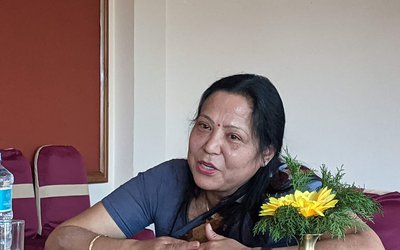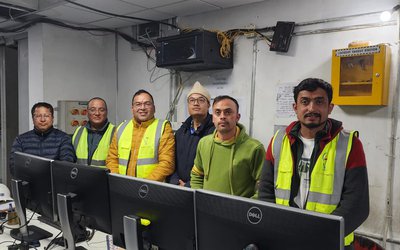LAL SHANKAR GHIMIRE, joint secretary and Chief of Foreign Aid Coordination Division of Ministry of Finance, joined civil service in 1989 as a section officer at the Ministry of Finance. Ghimire, who also worked in the capacity of Director’s Advisor in the Board of Directors of the Asian Development Bank in Manila, the Philippines, between 2004-06, was promoted to joint secretary in 2009 after working as undersecretary for 13 years. Ghimire, who did his MSC from University of Bradford, United Kingdom, spoke to NEW SPOTLIGHT on various issues. Excerpts:
How do you see the state of foreign aid in Nepal?
Globally, the number of donor countries has increased but the volume of foreign aid has declined. Despite increase in the number of donor countries, the volume of foreign aid has declined in Nepal too. The number of recipient countries has also increased. Many countries like Singapore and the United States of America do not want financial assistance but they want assistance in knowledge. One of the reasons behind the decline in foreign aid is their own economic burden due to change in demography as well as due to financial crisis. Due to financial crisis and other social volatilities, direct impacts have been seen on the volume of foreign aid in recipient countries like Nepal.
In real terms, I cannot say that the volume of foreign aid has declined but what I can say is that aid is competitive in the context of Nepal. If we cannot use it effectively and efficiently, the volume of aid will decline further.
In the context of Nepal, over 70 percent of capital expenditure is financed by foreign aid. The ratio between bilateral and multi-lateral is fifty-fifty. However, it depends on the project approval. For instance, the World Bank’s contribution is the highest for last year but it is not necessary that it will continue for this year also. Even if it increases, Nepal cannot absorb it as Nepal has half a dozen of projects now financed by the World Bank.
There is a possibility of declining the foreign aid but Nepal’s annual foreign aid continues to increase. If you see the last 5 years’ average received in foreign aid, Nepal received a sum equivalent to Rs. 51 billion annually. In the year 2010/11, Nepal received Rs. 106 billion as foreign aid. It was Rs. 97 billion in 2009/010 and Rs.47 billion in 2008/09. We have 40 plus official donors. There is no sector which does not involve foreign aid. From prime minister’s office to finance ministry and National Planning Commission, most depend on foreign aid.
What is the status of foreign aid?
At a time when we are searching donor agencies to support our projects and programs, it is unfortunate that the government agencies are unable to spend the money. The scenario is that we have funds equivalent to Rs. 200 billion as unused money which we can easily access. There is 1.6 billion dollars of new aid commitment to Nepal. But, there is low expenditure.
Why is there no or low expenditure?
In the last five or six years, rare cases of hard conditions were attached in the foreign aid, including in the criteria for imbursement and institutional change. On the one hand we have been demanding more foreign aid but we have failed to spend them. It is very strange. Recently, there has been a trend in the government offices to use Nepal’s budget or money. Because of good revenue generation, there is an increase in the availability of Nepal’s money. It is easy to spend Nepalese money compared to foreign aid as there is weakness in accountability parts of Nepalese budget. Even if there is no condition attached in donor’s money, there are certain criteria to fulfill for foreign aid. For instance, concerned ministry or department has to prepare the financial report annually, to submit the progress report timely and hand over the audit report. This is one of the reasons Nepal failed to spend the foreign aid. Money is available from two sides, the government and donors. Enforcement and accountability part is weak in government expenditure. Thus, officials feel it easier to spend from its money.
What are Nepal’s priority sectors for foreign aid?
The priorities of the government are power, tourism and civil aviation, agriculture and infrastructure. However, if you see the last five years’ experiences, foreign aid is coming in education and health sector, which are much higher than others.
What is the status of social sector?
The government is giving high importance to social sector. The present government ‘s priority is high economic growth and employment generating activities. Without reducing the budget of social sectors like health, education, drinking water and sanitation, Nepal is seeking the budget in sectors which will contribute to growth.
How do you rank donor’s contribution in terms of their aid?
Personally, I believe that it is wrong to compare the countries in terms of their annual contributions. The amount of contribution of the donor communities depend on year to year basis. There is also the tradition in Nepalese society that if some government fails to bring the foreign aid it is considered as incompetent. Aid process as a cycle is not a yearly issue but it is a long term commitment which needs to be approved by the parliament of countries concerned. We sometimes consider visiting high level leaders are capable to express the amount of money spontaneously. It is wrong. Even if prime minister or leader of particular country wants to give the money, he has to follow his country’s processes. In the year 2010/011, top five donors are the World Bank, ADB, China UN and UK. Comparison is unjustifiable.
Is the government revising foreign aid policy now?
Nepal’s foreign Aid policy was prepared in 2002. Policy document itself is a dynamic document. It needs to be updated and revised from time to time. Although we have announced Foreign Aid Policy in 2002, the Aid harmonization and Paris declaration were adopted in 2004 and 2005 respectively. Now the context has changed and the modality of aid has also changed and Aid became competitive. As the international and domestic context has changed, the government has realized the need to revise or revisit Foreign Aid Policy 2002. We have been in the revision process of foreign aid. We are now in the process of consultation with various stakeholders, including donors, government, INGOs and NGOs. We are now considering to organize wider consultations.
How do you see the INGOs and UNDP?
UNDP is itself not a donor. Under the UN, we receive technical assistance. All aid comes from the same origin. It is contribution of member states. In terms of origin, the source of multilateral and bilateral aid is the same. So far as International Non-governmental Organizations, INGOs, are concerned, Finance Ministry does not deal directly with them. The right to mobilization of INGOs fund is the sole responsibility of the Social Welfare Council. The ministry has indirect involvement in dealing with INGOs. We have our representatives in Project Facilitation Committee under the Ministry of Women, Children and Social Welfare. This committee is responsible to allow INGOs to work.
Sometimes in the past, we used to listen to the discussions that Nepal does not need aid. In the present context of globalization, no country can survive alone. Thus, we need to take a precaution before making such comments. In the present context, foreign aid is not only the money coming from check but there is also the knowledge aid. No matter how rich you are, you need aid.
What are some of the main problems?
We have very nominal involvement in the project preparation. We do little homework in negotiations. Foreign Aid is now very much competitive and we need to prepare for the as per the changing context. We need to take ownership of foreign aid. Although it was built in Nepal, we still say Indian road, Chinese road, Japanese road, ADB’s road or the World Bank’s project. We need to have a sense of ownership.
How well do we complete projects?
More than sixty percent of the projects are not running in agreed schedules. Out of this, only 10 percent projects have less than 15 percent progress physically. Once we bring the project, we need to work sincerely, taking it as our own project.
- SWISS SUPPORT: Construction Of A Trekking Trail In Koshi
- Dec 19, 2024
- PM OLI'S VISIT TO CHINA: BRI Agreement
- Dec 16, 2024
- RASUWAGADHI AND SANJEN: Begin Generation
- Dec 03, 2024
- NEPAL, INDIA ELECTRICITY TRADE Nepal's Advantage
- Dec 02, 2024
- PM Oli'S VISIT TO CHINA: Nepal's Dilemma
- Dec 01, 2024
















